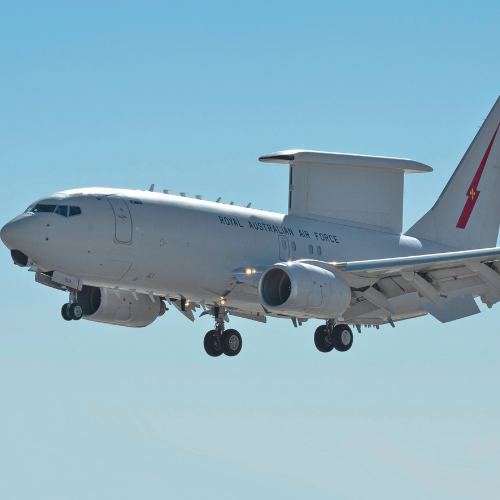A provisional deal to supply the E-7 Wedgetail aircraft has been secured by Boeing with the U.S. Air Force in a pivotal development. This contract marks Boeing’s first major success following recent legal troubles, emphasizing a significant rebound for the company’s defense sector amid a period of financial and legal strain.
Importance of the E-7 Wedgetail
The E-7 Wedgetail deal is particularly notable given Boeing’s recent guilty plea in the 737 MAX case, which raised concerns about the company’s future prospects. Despite these legal issues, the provisional agreement with the Air Force highlights Boeing’s ongoing relevance and capability in the defense sector.
The deal involves the provision of the E-7 Wedgetail to replace the aging E-3 Sentry aircraft. Designed to offer advanced radar and surveillance capabilities, the E-7 Wedgetail is set to play a crucial role in modernizing the Air Force’s airborne early warning and control operations. The aircraft, based on the Boeing 737 platform, is expected to enhance the Air Force’s operational effectiveness and technological edge.
Role of Shay Assad in the Negotiations
One of the critical factors in finalizing this deal was the involvement of Shay Assad, a former Pentagon negotiator renowned for his expertise in securing favorable defense contracts. Assad was brought back to navigate the complex negotiation process and address significant challenges, including disputes over unexpected nonrecurring engineering costs. His role was pivotal in overcoming these obstacles and moving the E-7 Wedgetail deal forward.
Challenges in Negotiating the E-7 Wedgetail Deal
The negotiation process was marked by difficulties, with Air Force officials previously expressing concerns about the costs associated with the E-7 Wedgetail program. These challenges, including disputes over pricing and project feasibility, required intensive negotiations to resolve. With Assad’s intervention, both Boeing and the Air Force managed to address these issues and advance the provisional deal.
Prototyping and Future Production
The E-7 Wedgetail deal includes two test aircraft as part of a “rapid prototyping program” designed to establish a cost-effective foundation for future production. According to Andrew Hunter, the Air Force’s acquisition chief, this approach will ensure that the final product meets the necessary requirements while managing costs effectively. The prototyping program is crucial for validating the E-7 Wedgetail’s capabilities and ensuring it aligns with the Air Force’s needs.
Boeing’s Commitment and Adaptability
Boeing’s commitment to reducing costs and addressing the Air Force’s concerns was evident throughout the negotiation process. The company, along with its suppliers, made significant adjustments to their proposals to bring the cost of the E-7 Wedgetail program down. This adaptability highlights Boeing’s dedication to maintaining a strong partnership with the Air Force and delivering a high-quality product.
Broader Implications for the Defense Industry
The E-7 Wedgetail deal is not just a significant win for Boeing; it also has broader implications for the defense industry and international partnerships. Last year, Boeing’s Wedgetail won a competitive bid to replace NATO’s fleet of E-3 Sentry AWACS radar planes, demonstrating the aircraft’s global appeal. This new contract with the U.S. Air Force further solidifies Boeing’s position as a leading provider of advanced defense technology.
Impact of Boeing’s Legal Issues
Despite the positive developments surrounding the E-7 Wedgetail deal, Boeing’s recent guilty plea remains a contentious issue. The plea, related to the 737 MAX crashes, has faced opposition from victims’ families and raised concerns about the company’s future. Nonetheless, the Pentagon has indicated that it will continue to do business with Boeing, provided the company meets the necessary standards of responsibility and performance.
The provisional deal for the E-7 Wedgetail represents a crucial achievement for Boeing as it works to recover from recent setbacks. This agreement not only highlights Boeing’s ongoing role in the defense sector but also emphasizes the importance of effective negotiation and strong partnerships in navigating complex defense contracts. As the deal progresses towards finalization, it serves as a testament to Boeing’s resilience and continued significance in the defense industry.


